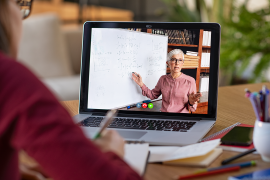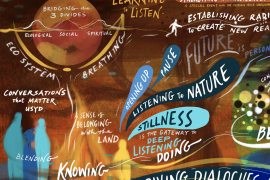Living through a global event in which we haven’t experienced the likes of before, there is no better time to focus on the fantastic and innovative work our colleagues continue to do in their online classrooms. Since the University’s shift to online teaching on March 23, there have been different approaches to how best utilise resources for student engagement and cohort building.
We spoke to Dr Christine Grice from the Sydney School of Education and Social Work on her use of formative pre-assessment methods in her postgraduate Master of Educational Management and Leadership unit, EDPA5001 Organisational Theory, Management and Administration, and here is what she had to say.
Can you explain the pre-assessment methods you have implemented into your teaching and how it has been received?
I redesigned the unit so that the assessment tasks were connected, and to be experimental. I used a formative assessment method that linked into and built towards two summative assessments that connected research with practice. Students had to understand organisational theory in order to think about how they might apply their understanding of research and ethical practice. Initially, students didn’t understand the purpose of the first formative assessment task: an online research methods post. But as soon as they started working on it and received peer feedback, they were incredibly appreciative and understood its value. They were able to apply meaning more quickly in their own context through a peer’s feedback. The online posts were in the discussion forum, and they couldn’t see other people’s discussions until they had posted. Viewing other people’s posts supported them to improve their own future posts.
I tried to build a consultative environment, as opposed to a competitive learning environment, which was a new way of approaching learning for many students. The research methods skills they developed helped them to set up their assignments so that they could focus clearly on the ethical issue they were trying to solve, connecting their leadership purpose with The University of Sydney graduate attributes in their research pitch. This process enabled them to think with greater depth about these issues and it also helped equip students whose first language isn’t English. Students provided positive feedback about the assessment process.
Has this practice been incorporated as a result of the shift to online teaching? How would it work in a face-to-face environment?
The online teaching environment helped with this shift because Zoom breakout rooms supported collaborative learning. Breakout rooms really helped students to get to know everyone in the seminar group because they’re randomised. Cross-culturally, it was amazing seeing students connect with others. By preparing responses to questions in advance, I created a safe space that allowed everyone to contribute. The only disadvantage was that sometimes students’ bandwidth is weak, but in those circumstances, they used chat box.
Student commitment levels were incredible.
I had students Zooming into our seminars from Sydney, London, Oman, Beijing, and even one student logging in at 3 am from Chile! The Zoom drop-in sessions were not compulsory, but was a very collaborative way for students to stay connected, which they are all very much appreciated. Following this experience, I will still use this functionality in a blended learning environment.
Reflecting on your experience, what advice would you give others wanting to implement a similar strategy in their teaching?
The key advice I would give, from my own experience, is to carefully prepare discussion questions in advance, keep the questions simple to enable robust discussion, and think about alignment with the graduate attributes in terms of your overall assessment program.
My most important realisation during COVID-19 teaching was that postgraduate students highly value informal networking opportunities.
Students were missing out on the usual opportunities to talk to each other during COVID-19. In response, I needed to facilitate gatherings for our future educational leaders, those students who had come to Sydney from all sorts of backgrounds, and wanted to make network connections here in Sydney. This was, and remains, critical to the learning experience and the course, as much as the theoretical or practical aspects that we offer. Students wanted these informal networks to draw upon and to support one another in future projects. More than friends, they become ‘networked educational leadership colleagues’!
I reflected on the impact that transitioning online had on my students and, in particular, on my international students. They shared with me how they had chosen to come to Sydney to learn how to engage and make friends ‘in person’ in a new country with a different culture. As they moved online, they weren’t able to make friends in the same way. To create informal opportunities though Zoom, I kept sessions open, left my home office, closed the door and let them chat up without me there for 20 minutes, so that they could have their after-class experience online.
Generally, full-time students and international students wanted to invest more time in reading, assignments, and spending time with each other and enabling this was crucial – they wanted to build meaningful connections and invest time in each other.
However, by comparison, I noticed that many Masters-level local students studying part time (rather than full time) didn’t want to invest any more time in activities, virtual or in-person, because they were juggling work and family. They preferred direct email contact or telephone conversations with me, which I also made time for.
These experiences have taught me first and foremost that all students at Masters level deeply value our expertise and mentorship.
Students appreciate the one-on-one advice that we give, and that teaching is a deeply relational act.
My students wanted one-on-one opportunities to ask questions or seek advice like the would have been able to do in class and, not surprisingly, our student email load has increased during COVID-19. Our students continue to seek opportunities to be challenged and develop new skills in research, knowledge, communication, and applied practice. We will continue to deliver this online and/or face to face as well as providing global networking opportunities with other adult learners, connections that will stay with them long beyond their course.





